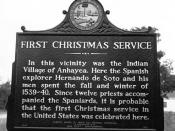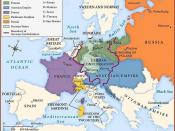Latin American Independence
*Inspired by Enlightenment ideals, the people of Latin America rebelled against Spanish & Portuguese rule in the early 19th century. Rebels in the Spanish colonies waged a series of hand-fought military campaigns to gain their independence, while Brazil carried out a peaceful revolution to free itself from Portugal
*From 1814-15, the Congress of Vienna, which was organized by Prime Minister Metternich of Austria, met to discuss the future of European politics
*The main goals at the Congress at Vienna included:
oA relation of the monarchy in France and a return to old ways of governing people.
oAttempts to limit the spread of ideals about democracy. Although constitutional monarchies were permissible, absolute monarchies were preferred.
oBy the time of the Congress of Vienna, there were 3 primary political views forming through Europe: Conservatives, Liberals, and Radicals
Conservatives: Usually wealthy landowners and nobility argued for protecting traditional monarchies of Europe.
In France, conservatives allowed for the creation of a constitutional monarchy.
Liberals: Mostly middle class, business leaders and merchants wanted to give more power to elected parliament in which the educated &landowners could vote.
Radicals: They scrimpy wanted to extend democracy and freedom for all people
*Key Leaders in the L.A independence movements
oSimon Bolivar: helped both Venezuela and Peru to gain independence
oToussaint L"Ouverture: declared Haiti an independent nation
oMiguel Hidalgo: a priest who declared Mexico's independence from Spain
oO'Higgins: declared Chile independent and became the first president there
oHose de San Martin: defeated the Spanish in 1810, but was captured and sent to prison
oJean-Jacques Dessalines: defeated Napoleon's Army in Haiti
*The Revolutions broke out in Europe. The people that were involved were the Poles, Danes, Germans, Italians, Czechs, Slovaks, Hungarians, Croats, and Romanians
*These revolutions broke out for reasons such as recession, abuse of political power,


